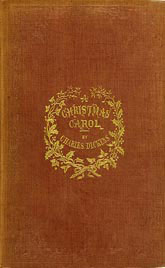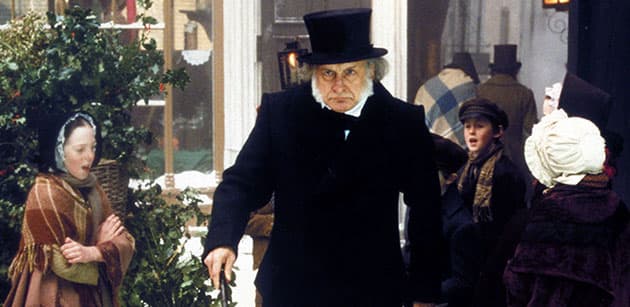A Christmas Carol
Critique • Text • At the movies
 First edition
First editionOriginal title
A Christmas Carol. In Prose. Being a Ghost Story of Christmas.
First publication
1843
Literary form
Novella
Genres
Literary
Writing language
English
Author's country
England
Length
Approx. 28,000 words

The unreformed Scrooge (George C. Scott) goes about his business in 1984 production.
An all-too-human Scrooge
A Christmas Carol (1984): Television movie, 100 minutes; director Clive Donner; writer Roger O. Hirson; featuring George C. Scott, David Warner, Roger Rees, Edward Woodward
George C. Scott is probably the finest actor to essay the role of Ebenezer Scrooge and he brings an entirely different dimension to the character.
The 1984 adaptation of A Christmas Carol was shot in England for TV, directed by Clive Donner, who had worked as a young editor on the 1951 Scrooge. The special effects are nothing special—the ghostly apparitions are no more sophisticated than those in films decades earlier—but 19th-century London is evoked realistically in sombre colour.
However, it is the subtle acting of the American Scott that makes this version unusual. I'm not saying he makes the best Scrooge or he makes this film the best Christmas Carol—but he makes it one of the most interesting.
The most unsettling even. For this Scrooge is not a caricature. He's a real man, and that can be upsetting. For the most part, Scott is low key. He plays the old miser as a regular person set in his ways would respond to what's happening about him. We can see in his face and small gestures that he's considering what he's shown, giving in on some points, dismissing others, being seduced by some scenes of jollity or hardship, closing his mind against others—without saying much at all. And when he does speak, it's offhand, as we all speak in real life.
This may be annoying to viewers who await the declamation of famous lines only to have them tossed off as if unthinkingly. But it humanizes Scrooge, so that we sympathize with him long before his reformation. And when the fireworks do come, they are all the more forceful because of the calm before. Scott is an actor who always comes across as containing a deep fury within himself and it works here to create a volatile Scrooge.
One of the oddest scenes is actually the reconciliation with nephew Fred (Roger Rees) and his wife (Caroline Langrishe). It occurs not at a party, as in most other films, but with the three characters only. After Scrooge makes his apologies for past behaviour, they all profess happiness at their new-found togetherness. But the actors play the scene so realistically, with the awkwardness that would naturally ensue, that we don't get the anticipated release. That comes only with the final at-work scene with Scrooge and Cratchit, when Scott lets his barely containable joy show through.
Cratchit however is miscast. The worthy David Warner is too big and too hard (and perhaps too well-known for his villainous roles in other movies) to be believable as the meek and loving family man.
An interesting bit of casting though is Edward Woodward as Christmas Present. This spirit is usually the image of joviality, close to the modern icon of Santa Claus, until he takes a turn for seriousness near the end of his reign and turns Scrooge over to the doom-saying ghost of Christmas Yet To Come. But Woodward, made to appear gigantic, has a sharp edge and engages in a gibing battle of wits with Scrooge almost from the beginning.
Also this is the only version of A Christmas Carol I can think of in which we get to meet Scrooge's father, who turns out—contrary to most renditions and Dickens' own text—to have remained harsh towards young Ebenezer. This makes more sense in explaining Scrooge's development into such a harsh figure himself.
All in all, this is a film adaptation of A Christmas Carol to watch after seeing one of more of the earlier versions in order to appreciate the different twists.
— Eric

